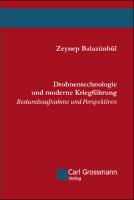Drohnentechnologie und moderne Kriegführung
Bestandsaufnahme und Perspektiven
Abstract
Are armed drones a permissible and harmless military technology from the point of view of international humanitarian law? With this question, the author puts the much-discussed armed drones to the test of Article 36 of the First Additional Protocol to the Geneva Conventions, which imposes on states an obligation to test new weapons and means of warfare. Furthermore, the work deals with three controversial political theses around the effects of drone technology on modern warfare and explains what relevance these have from the perspective of international humanitarian law. The present work thus gives a complete view of the question of the admissibility of armed drones raised above. Handelt es sich bei bewaffneten Drohnen um eine aus Sicht des humanitären Völkerrechts zulässige und unbedenkliche Militärtechnologie? Mit dieser Frage stellt die Autorin die viel diskutierten bewaffneten Drohnen auf den Prüfstand des Art. 36 des Ersten Zusatzprotokolls der Genfer Konventionen, welcher den Staaten eine Prüfpflicht neuer Waffen und Mittel der Kriegführung auferlegt. Im Weiteren befasst sich das Werk mit drei kontroversen politischen Thesen rund um die Auswirkungen der Drohnentechnologie auf die moderne Kriegführung und legt dar, welche Relevanz diese aus der Sicht des humanitären Völkerrechts haben. Das vorliegende Werk gibt somit eine vollständige Sicht auf die oben aufgeworfene Frage der Zulässigkeit bewaffneter Drohnen.
Keywords
Geneva Convention; Drones; Principle of distinction; International humanitarian law; Drone war; Martens Clause; Targeted killing; Weapons testing; Genfer Kovention; Drohnen; Unterscheidungsgrundsatz; Humanitäres Völkerrecht; Dronenkrieg; Martens'sche Klausel; Targeted Killing; WaffenprüfungDOI
10.24921/2021.94115956ISBN
9783941159556, 9783941159563Publisher
Carl Grossmann VerlagPublisher website
http://www.carlgrossmann.com/Publication date and place
Berlin, 2021Classification
International law


 Download
Download Web Shop
Web Shop